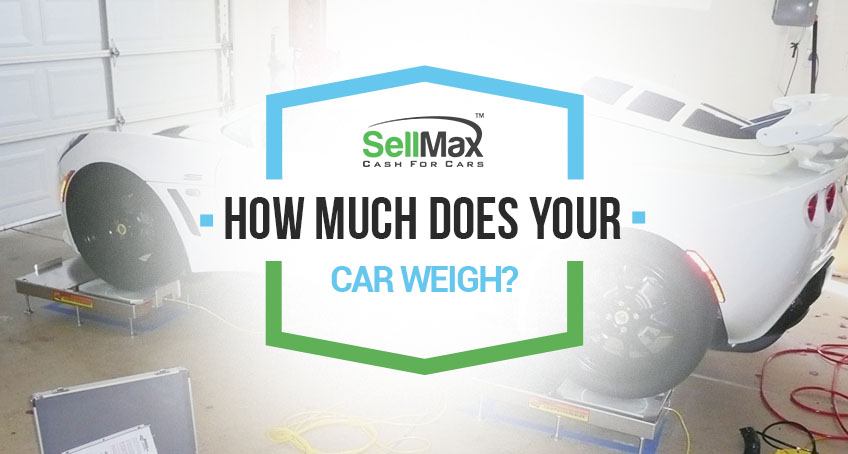Here's Why Knowing How Much Your Car Weighs Is Important.
Blog/ Here's Why Knowing How Much Your Car Weighs Is Important.

AuthorSarah RobinsonCategory Car Advice
“How much do you weigh?”
We believe you know the answer to this question plus you’d agree that being conscious of your body weight helps you know when you’re going overweight. Right? Exactly. But we still have another important question.
“How much does your car weigh?”
You’re probably wondering why this is important as you’ve never thought about it.
Well, no matter how you choose to look at it, knowing how much your car weighs is important.
Want to know why? We’ll tell you in this article.
So, let’s ride…
How Much Does The Average Car Weigh?
Your car’s weight depends on its model, the year it was made, the materials used and the car type. So, what does the average car weigh? According to the U.S. Environmental Protection Agency (EPA), it was stated that the average weight of a car in 2018 was over 4,000 pounds and has remained so since 2004.
For small cars [e.g. Ford Fiesta] it’s over 2,500 pounds and large cars [e.g. Audi A8] can go as high as 4,200 pounds. SUVs or trucks can range from 3,500 pounds - for small ones - to over 6,000 pounds for the large ones.
Why It’s Important to Know Your Car’s Weight.
Here are the reasons why knowing how much your car weighs is important:
- Buying A New Car: When you want to buy a new car, you should know the weight so you don’t go higher than the Gross Vehicle Weight Rating [GVWR] in your state.
- Auto Safety: Knowing your car’s weight is a huge step to auto-safety. This is because when it comes to auto accidents, compact cars are at a bigger loss or disadvantage to larger cars or trucks. For every 1,000 pound drawback is an increased fatality rate of over 40%. Also, some bridges have certain weight limits. You’d feel more relaxed crossing a bridge with a weight limit when you know how much your car weighs.
- Routine Maintenance: When you want to carry out routine checks on your car, you’d need to use the best tools for the job. Knowing your car’s weight will give you an idea of the suitable tools that will sufficiently handle its weight.
- Fuel Economy: The EPA states that for every 100 pounds reduced from a car’s weight, there is an increase of about 1 – 2% in its fuel economy. This means you’ll be able to save up more on fuel and cash at a reduced car weight. Tip: Besides your car’s weight, always check your car for unnecessary junk weight to get rid of.
- Payload: When you know your car’s weight, you’d also know how much weight your car can handle [in terms of passengers and cargo] without causing excessive wear and damage to it.
Types of Car Weight.
It’d interest you to know that there are different types of car weight. Being familiar with them will help you understand the ways a car weight can be measured. Here are the most common ones:
- Curb Weight: This is the car’s weight without the driver, passengers, equipment and cargo. Note: The weight we’ve been discussing so far is the curb weight of your car.
- Gross Vehicle Weight (GVW): This is the curb weight plus the passengers, cargo and extra equipment.
- Gross Vehicle Weight Rating (GVWR): This is the maximum weight your car can carry. Exceeding this will compromise your safety and will damage your car.
- Payload: This is the Gross weight of your car plus everything it carries. Whether it’s in your car or your car is towing it…it’s called payload.
How To Know How Much Your Car Weighs.
We’ve put together simple, reliable tips to help you find out how much your car weighs. Note: These tips are more reliable than following a general car weight guide as your car model might have different equipment or build.
- Check Your Car’s Manual: If you’ve got a manual for your car, check for its curb weight on the specifications section. If you don’t have one, you can find one online for a small fee. We do recommend you to own one as you’ll need it for other purposes too.
- Check the Driver’s Side Door: You should find a sticker on the driver’s side door. You’re likely to find the Gross Vehicle Weight Rating (GVWR) and sometimes the curb weight too.
- Check the Manufacturer’s Website: Look up your car’s specifications on the manufacturer’s website. This will provide you with the curb weight of your car.
- Have Your Car Weighed: You can have your car weighed at a vehicle inspection center or a junkyard using a car scale to know its Gross Vehicle Weight.
Prices of Car Scrap Metal (Weight) and Your Car’s Junk Value.
If you want to get the best scrap value on your car, then you should find out your car’s model, make and the year it was made. You should also find out how much your car weighs as it’ll help you determine how much you’d get for your car before taking it to the junkyard. If the prices of scrap value fall or you don’t like the quote offered, then you can do any of these to get a better deal:
Sell Your Car By The Parts.
Even if the prices of scrap metal fall, you can always sell the valuable parts of your car for good prices. These parts include the Catalytic Converter, and the head gasket
Wait.
You can hold on to your car till the prices of scrap metal rise again or until you find a reasonable buyer that buys junk cars for cash.
Sell Your Car To Us.
At SellMax, there’s no right time…it’s always a right time. We’ll give you a competitive offer no matter your car’s condition. We’ll also come to you wherever you are and tow your car for free!
So, why wait? Get Your Offer Now!
